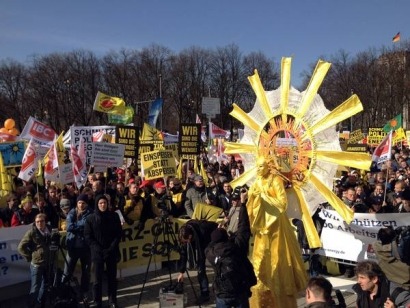
The mass rally at the Brandenburg Gate was called by BSW-Solar, together with the Confederation of German Trade Unions (DGB), the Industrial Union of Steel Workers (IG Metall), the Mining, Chemical and Energy Industrial Union (IG BCE) and German Environmental Aid (DUH). At the demonstration, political leaders including Sigmar Gabriel, Jürgen Trittin and Gregor Gysi declared their solidarity with solar industry employees who would be affected by the cuts.
It was announced last month that the German government plans to amendment the feed-in tariffs for renewable energy, with the solar PV tariff being cut by 28% in 2012 – twice the rate of cuts seen in 2011. Estimates show that as a result, German households would only ,make an average savings of €0.30-0.60 per month by installing a PV array on their roof.
The organizers of the rally therefore appealed to members of the German Bundestag and to the Federal Chancellor to forego additional cuts in the support for solar power, which is already in rapid decline.
“If the draft legislation is not stopped or significantly revised, the solar industry fears a market downturn of up to 75 percent. In the process, the operation of solar power systems will for the most part become unprofitable, a wave of bankruptcies will be inevitable, and 100,000 jobs will be threatened,” says BSW-Solar. “The energiewende, Germany’s transformation of the energy system, cannot possibly succeed without a continued robust expansion of the use of solar power.”
According to BSW-Solar calculations, the proposed list of cuts in the sum of all its components, will amount to cuts in the support for solar power to the magnitude of – depending on segment – 30-50% by the end of the year. This could hit the industry hard as German solar PV manufacturers are already facing tough times through increased competition.
Prof. Dr. Eicke Weber, Director of the Fraunhofer Institute for Solar Energy Systems in Freiburg, said: "The Heave-ho action lacks any scientific basis, just before the breakthrough we are running the serious risk of the fruits of years of technological leadership being gambled away recklessly. Germany must return quickly to a predictable economic and energy policy. "
Renewables produce more than nuclear
Meanwhile, the German renewable energy institute, IWR, has evaluated data from the European Energy Exchange (EEX) in Leipzig, concluding that the contribution of renewables to electricity production continues to grow in Germany.
In the first two months of 2012 the output of wind and solar power plants totalled 13.2 billion kilowatt hours (Jan. - Feb. 2011: 9.3 bn kWh), a year-on-year increase of 42%.
"This means that wind and solar power plants have produced more electricity than all eight decommissioned nuclear power plants in Germany could theoretically have produced in this period," said IWR Director Dr. Norbert Allnoch.
According to Dr. Allnoch the talk of an alleged electricity shortage prompted by the activation of the country's cold reserve is completely wide of the mark. The Federal Network Agency assumes that the tapping of these reserves at the start of February was prompted by energy traders.
Significant shortfalls amounting to several thousand megawatts were attributed to alleged "load forecast errors" which then had to be offset.
"It is very surprising that it was possible to calculate a more precise output forecast for the supply of wind and solar electricity than for electricity from conventional power stations," said Dr. Allnoch.
For additional information:

